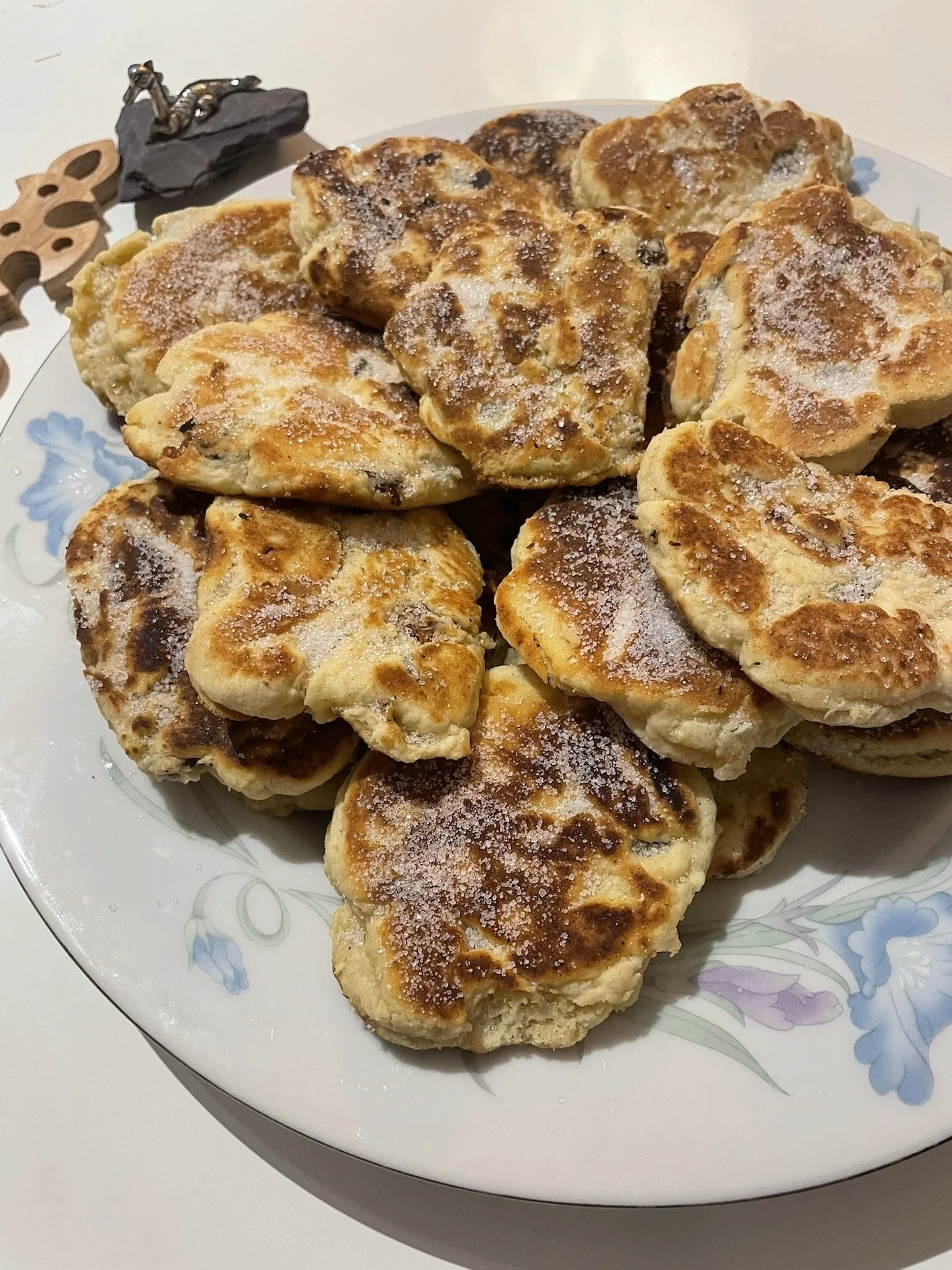Like my grandmother used to make: Cacen Cymraeg
Passed down through generations, this family recipe for Cacen Cymraeg – Welsh cakes – is more than just a treat. It’s a link to language, memory, and home. In this piece, one local shares how baking became their way of preserving heritage and passing it on, one cake at a time.
Welsh cakes on a flowery plate, Welsh dragon on slate and a Welsh lovespoon in the background!
Words and photo by Clare Roberts
I grew up making Cacen Cymraeg (Welsh Cakes) with my mum, who passed the recipe on to me in English. She learned it from her mum, who learnt it from hers. My grandma (nain in Welsh) passed it on in English and Welsh. Although I didn’t work hard enough to preserve our language, I preserved this recipe instead.
Officially, this treat is a unique Welsh recipe which can be traced back to the 1800s, but there are similar recipes across the world. Cacen Cymraeg goes by many names including picau ar y maen, which means cakes on the stone, griddle cakes or miners cakes. They are a treat for any time of day with a cup of tea.
Historically, all Welsh food could be described as pauper's food, made with basic ingredients, often the only ones you can guarantee to find in your pantry. Similarly dishes like rarebit to bara brith (meaning speckled bread in Welsh) are made with basic ingredients. Yet, the only place I can find Welsh cakes in Glasgow is in Marks and Spencers. Most people who have moved to Scotland will know the struggle of craving food from home and having to make it themselves but maybe there’s some appeal in making it yourself because it tastes best fresh?
When people think of Welsh food, they don’t think of dessert so I like to surprise people with something from home. Cacen Cymraeg are always cooked in a batch and are designed to be shared. After college, I moved to Argentina for a year. Whenever I felt the most homesick, I would make Welsh cakes for my friends. This was my first time making them – or any baking – without my mum. I became known for them and I even went to friend’s houses to bake them together, passing on the recipe.
The measurements have been refined over time. “But how much flour do I need, exactly?” my mum would ask, since my grandma would never give exact measurements for the sugar or the flour. Baking is a science, after all, but in experienced hands, science is simply another form of art. My mum would tell this kind of anecdote to me when we baked using the scales. Yet, I found myself asking her the same question and she would reply with her hands as a form of measurement, “this much.” Indeed, after a few solo attempts, I have found that to be true. My hands figure out the measurements and, as mum would say, “you just know.”
My nain would sometimes add a pinch of mixed spice, if she had any. My mum doesn't add any spice except a pinch of salt occasionally, as the mood takes her. Perhaps as a method to meet my lineage in the middle, I add half a teaspoon of cinnamon and a pinch of salt.
Ingredients (makes 25-30 Welsh cakes):
350g self-raising flour
220g butter
125g caster sugar
2 tbsp milk
½ tsp cinnamon
1 egg
1–2 handfuls of sultanas
Pinch of salt
Pinch of caster sugar (to serve)
Method:
Sift flour in a bowl then add your cinnamon and salt. Gradually add the butter, rubbing it together by hand.
Stir in sugar and sultanas. Beat the egg and add it to the mixture with the milk, until it is all a thick consistency.
Roll out the dough onto a floured surface, about a ¼ inch thick and cut it into rounds – use a 5/6cm cutter or a mug.
Lightly grease a nonstick frying pan and cook on a low heat, about 2-3 minutes on each side until they are golden brown.
Once they are off the grill but still warm, dust with caster sugar and stick the kettle on to enjoy with a cup of tea.
Tips:
Swap sultanas with raisins if you prefer!
Don’t worry if you slightly burn any sides because you sprinkle sugar over them.
They keep for up to a week in an airtight container but believe me, once you’ve tasted them, they probably won’t last more than two days.
